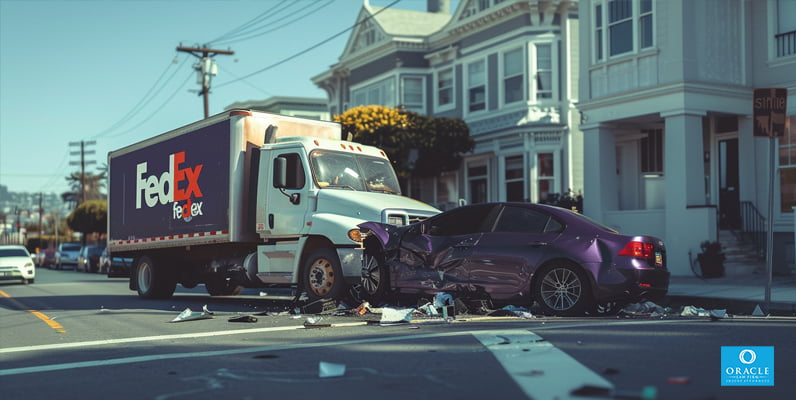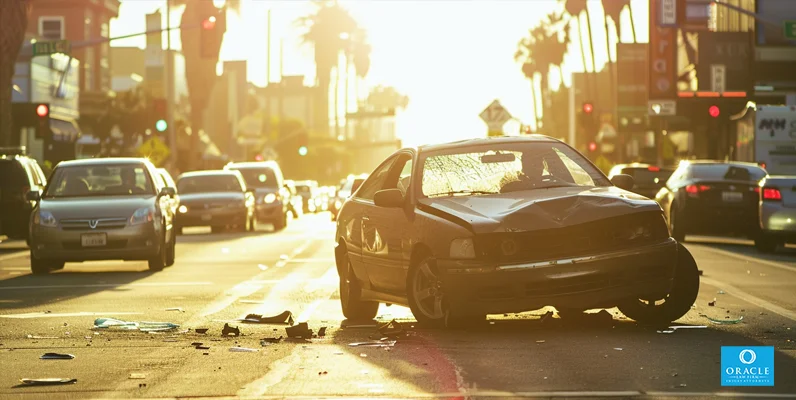Facing a DOT-recordable accident can significantly affect a driver’s career and a carrier’s operation. Defined by incidents on public roads involving commercial vehicles—resulting in injury, fatalities, or disabled vehicles—these accidents trigger a specific regulatory and compliance process. This article delves into what you need to know about DOT recordable accidents, from immediate reporting to lasting repercussions in the industry.
Key Takeaways
- A DOT recordable accident is a serious incident that involves commercial motor vehicles and results in fatalities, injuries needing offsite treatment, or the car being towed, which must be reported for federal safety tracking.
- DOT recordable accidents significantly impact a carrier’s federal safety rating and a commercial driver’s CSA score, leading to higher insurance premiums and strict regulations and influencing future employment opportunities.
- Detailed documentation of DOT recordable accidents is mandated for trucking companies, and the accident reports kept in an Accident Register play a crucial role in FMCSA assessments and industry accountability.
Defining a DOT Recordable Accident

A DOT-recordable accident is no ordinary roadside occurrence. It’s an incident involving fatalities, injuries requiring immediate medical treatment away from the accident scene, or a commercial motor vehicle needing to be towed due to damage (typically a truck accident). But not just any car – we’re talking about commercial motor vehicles (CMVs) – those large trucks or buses used for business purposes, which may have an accident involving significant consequences.
These accidents must involve a CMV and occur on public roads, making the DOT recordable accident a specific subset of vehicular accidents. So, next time you see a large truck involved in a dot reportable accident, you’ll know the implications could be significantly more profound than a standard fender bender.
Impact on Carrier’s Safety Rating and Compliance
Moving on, we examine the consequences of these accidents. The role of DOT recordable accidents is vital in shaping the safety rating of commercial trucking companies. These accidents are reported to the Department of Transportation and contribute to a carrier’s incident rate on a federal level. The Federal Motor Carrier Safety Administration (FMCSA) keeps tabs on these accidents using the accident register maintained by trucking companies, directly influencing a carrier’s safety rating.
To ensure motor carriers and their drivers meet operational safety standards, the FMCSA uses accident data compiled from DOT reports to monitor their safety performance. Unfortunately, carriers with poor safety ratings, often due to multiple DOT recordable accidents, can face higher insurance premiums and may be subject to stricter safety regulations.
Moreover, these accidents impact a commercial driver’s CSA score, a public record potentially influencing future employment opportunities within the industry. A DOT-recordable accident is not just a one-time incident but a significant event that could shape the future of a driver’s career and a carrier’s reputation.
Documentation and the Accident Register

Beyond the immediate consequences, trucking companies must keep detailed records of these accidents. The DOT accident report must include the following:
- The date
- Location
- Driver’s name
- Number of injuries or deaths
- Details of any hazardous materials spilled or released besides fuel.
These records, maintained as accident reports for three years in an accident register, facilitate the FMCSA’s assessment of the carrier’s safety performance. With accident reports prepared, maintaining systematic documentation of motor vehicle accidents through an Accident Register is essential for monitoring safety incidents and ensuring accountability within the industry.
Consequences for Commercial Drivers
The impact of DOT-recordable accidents extends to the individuals behind the wheel. Commercial drivers involved in such accidents may have points added to their Commercial Driver’s Licenses (CDLs) through a point system, potentially affecting their driving privileges.
These accidents are documented in a commercial driver’s Drive-A-Check (DAC) report, which can influence future employment opportunities for a commercial driver with a commercial driver’s license. The DAC report is a comprehensive record that includes:
- A driver’s 10-year work history
- Criminal record
- Drug test results
- DOT infractions
- Accident history
All of these factors are critical in trucking companies’ hiring decisions.
Considering the importance of these reports, commercial drivers must verify the accuracy of their DAC report and rectify any discrepancies. Inaccuracies can have substantial repercussions on their job prospects in the trucking industry. Luckily, drivers can request a free copy of their DAC report through HireRight to review their reported accidents and infractions.
Legal Considerations and Representation
Following a DOT recordable accident, personal injury lawyers have a significant role in handling bodily injury cases, representing clients, and managing:
- Insurance claims
- Settlement negotiations
- Lawsuits
- Legal deadlines
- The collection of evidence
These lawyers utilize DOT accident reports as evidence and are well-versed in state and federal regulations concerning commercial vehicle accidents, including interstate or intrastate commerce.
Victims of DOT recordable accidents may receive compensation for:
- ambulance fees
- emergency treatment
- ongoing care
- lost wages
- property damage
- pain
- suffering
- disability
In extreme negligence or malice cases, punitive damages may also be awarded, underlining the gravity of reckless or malicious conduct.
Moreover, liability in these cases may extend beyond the driver to the trucking company, cargo company, or vehicle manufacturer, primarily if the accident was related to loading practices or mechanical flaws. Legal representation, therefore, isn’t solely about attributing blame; it’s also about securing justice and fair compensation for victims.
Summary
In conclusion, understanding the essentials of a DOT-recordable accident is crucial for everyone involved in the commercial trucking industry. These accidents significantly affect a carrier’s safety rating, a driver’s career, and the legal landscape for victims. The importance of diligent documentation, fair representation, and adherence to safety standards cannot be overstated.
Frequently Asked Questions
What is a collision register?
A collision register, also known as an accident register, is a record that motor carriers must maintain for any accidents involving their vehicles within the last year. This register should include details such as the date of the crash, location, driver’s name, injuries or fatalities, and the release of hazardous materials.
What is a non-dot recordable accident?
A non-dot recordable accident refers to an accident where the vehicles can safely drive away from the scene, and the property damage is minor, not meeting the criteria for DOT recordability.
What is the formula for the dot recordable accident rate?
The DOT recordable accident rate formula is calculated by multiplying the number of accidents by 1 million and dividing by the number of miles driven in the last 12 months. This rate includes factors such as drunk driving incidents and safety violations in its calculation.
What is an FMCSA reportable crash?
An FMCSA reportable crash is an occurrence involving a commercial motor vehicle that results in a fatality, personal injury requiring immediate medical attention away from the scene, or disabling damage to any vehicle that requires it to be towed from the scene. The Federal Motor Carrier Safety Regulations provide this definition.
What defines a DOT recordable accident?
A DOT-recordable accident involves a commercial motor vehicle and results in a fatality, a personal injury requiring immediate medical attention away from the scene, or disabling damage requiring vehicle towing.






